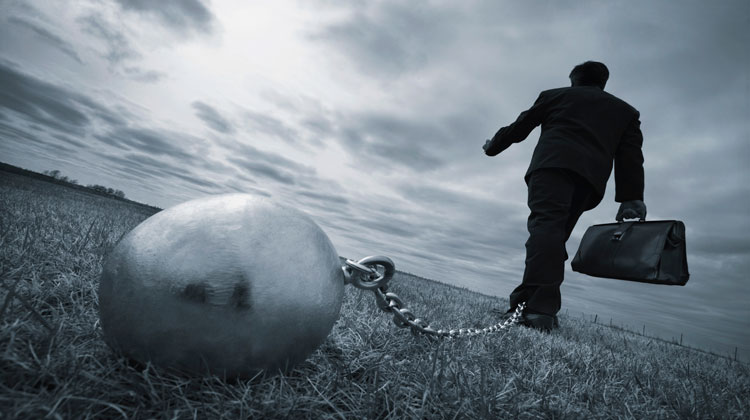THIS POST MAY CONTAIN AFFILIATE LINKS. PLEASE SEE MY DISCLOSURES. FOR MORE INFORMATION.
Debt is a huge problem for many people in the United States.
In fact, the average American household owes over $16,000 in credit card debt.
This doesn’t even include mortgage payments, student loans, and other types of debt!
Most people think the worst thing about debt is owing money to someone else.
But there are hidden costs to debt and these hidden costs are often overlooked.
And they have a huge negative impact not only on your financial situation, but all aspects of your life, including your health.
In this post, I’ll show you the hidden costs of debt you probably never thought of and how they impact your life.
By the end, you will have a better understanding of how dangerous it is to be in debt.
Table of Contents
11 Hidden Costs Of Debt
#1. Late Fees

One cost that many people are aware of is late payment fees.
If you make late payments, most creditors will charge you a fee.
These fees can be quite costly.
For example, my credit card charges a $35 late fee.
If I’m late on a monthly payment for two months in a row, they’ll raise my interest rate to 29%.
Late fees and the increased interest rate are extra costs that can add up quickly if you’re not careful.
So even if you don’t have enough money to pay your bill in full, at least make the minimum payment by the due date.
#2. Interest Payments
When you carry a balance on your credit cards or other types of debt, you pay interest every month.
Over time, this interest adds up, making the thing you purchased, that much more expensive.
For example, let’s say you worked hard to find a great deal on a new TV.
You found one that usually sells for $1,000 on sale for $700.
You pay with your credit card that charges you 18% interest and you make the minimum payment of $20.
It takes you over 6 years to pay off your new TV and you paid close to $513 as the total amount of interest paid for a total payment of $1,213.
In other words, all that work you did to save money was a waste.
In fact, you almost could have bought a second TV at that price with the interest you paid.
And seeing it’s over 6 years later, chances are you are on another TV.
What is even worse, if you are making just the minimum payments and still using the credit card for new purchases, you are paying interest twice.
Once on the old balance you didn’t pay off, and now additional interest on your new purchases.
#3. Opportunity Cost
Many people aren’t familiar with the term opportunity cost, but we face it every day.
Basically, it is all about the choices you make.
The opportunity cost of staying in on a Saturday night is missed time with friends.
- Read now: Learn more about opportunity cost
Or the cost of staying up late to watch a movie is less sleep.
When you’re in debt, you often have to make some tough choices.
Do you put money towards your debt or do you save for retirement?
Do you buy necessities like food or do you pay your bills?
These are the types of questions people in significant debt and even smaller debts face on a daily basis.
And more often than not, the answer is to pay your bills.
Opportunity costs force you to miss out on things in life because you stuck paying back your debt.
In short, being in debt often means you have to give up opportunities that could improve your life.
#4. Anger

Speaking of missing out on things in life, many people in debt experience anger.
Anger is one of the 5 stages of grief people go through.
They get angry at their credit card debt and how their life is playing out.
Many times, they are also angry at themselves for getting into the situation, but they project this anger onto their friends, their family, even their job.
- Read now: Discover the joys of debt free living
This makes others not want to spend time with the person, which only increases the emotion.
#5. Anxiety And Depression
Anxiety and depression are other real emotions is another hidden cost of debt experienced by people living with the financial strain of debt.
The anxiety comes from not knowing how you’re going to pay your bills.
How are you going to make it work this month?
What if next month is worse?
These are the thoughts that go through an anxious person’s head on a daily basis.
And it can be quite debilitating.
Depression often sets in when people realize they may never get out of debt.
They become bogged down by the enormity of the task at hand and it feels impossible to overcome.
Both anxiety and depression can keep people from doing what they need to do in order to get out of debt.
#6. Stress
Stress is another emotion people in debt experience on a regular basis.
The stress comes from all the different sources including money, relationships, work.
It can be quite overwhelming and it’s hard to shake it off.
Many people find that they can’t relax or enjoy themselves because they’re always worried about their debt.
This stress takes a toll on the body and can cause all sorts of health problems.
This includes things like heart attacks, strokes, and more.
And when you are stressed, there is a good chance you aren’t getting quality sleep, which only makes things worse.
#7. Denial
If stress, anxiety, anger, and depression weren’t enough, many people also go through a stage of denial about their debt.
Usually this happens before the other emotions bubble up to the surface.
They refuse to believe they have a problem or that their debt is out of control.
This denial can last for months or even years and it makes getting help that much harder.
The huge impact about being in denial is that you end up getting yourself into more debt.
This happened to me.
After I built up some credit card debt, I didn’t think much of it.
I ended up opening a new credit card so I could do a balance transfer and save money.
But I eventually started spending money on the original card.
Foolishly, I completed another balance transfer and eventually, started spending on the first again.
Because of my denial, I more than doubled the amount of credit card debt I was in.
#8. Shame And Embarrassment
Many people in debt feel shame and embarrassment.
This is especially true if they have to ask family or friends for help.
They often feel like they’re a burden and that they should be able to take care of themselves.
Or they might try to hide their debt by saying no to a lot of activities and events.
Shame and embarrassment can keep people from getting the help they need which only makes their situation worse.
#9. Financial Instability
Financial instability is another cost of debt people don’t think about.
When you’re constantly worried about money, it’s hard to make plans for the future.
You don’t want to spend any money because you never know when you’ll next have to pay your bills.
This instability makes it hard to save for things like a down payment on a house or car, to take vacations or go out with friends.
At its most basic level, you stop spending money and living life because you aren’t sure how you are going to pay your bills.
#10. Stuck In Life

How many people do you know are stuck working jobs they hate?
Maybe you are one of them.
For many people, they are stuck working a job they don’t enjoy because of debt.
Because they might have credit card bills, student loan debt, auto loans, personal loans, and a mortgage to pay every month, they need the income from their job.
Even though they would love to do something else with their life, they can’t because it doesn’t pay enough to pay for their debt.
This can be incredibly frustrating and it makes people feel stuck in life.
#11. More Expensive To Borrow Money
When you carry around debt, your debt to credit utilization ratio increases, which hurts your credit rating.
Your credit utilization ratio is the difference between your current debt and your available credit.
So if you have a credit card with a $500 balance and $1,000 credit limit, you have a 50% credit utilization ratio.
- Read now: Here are the credit card terms you need to know
- Read now: Click here to learn how to quickly improve your credit score
- Read now: Learn the financial behaviors that hurt your credit
Ideally, you want to be at 30% or less.
With a lower credit score, any new loan or credit card you apply for carries higher interest rates with it.
This higher interest rate means higher costs on the money you borrow.
Let’s go back to the new TV example above.
This time, you found the same deal, but because you are in debt, the interest rate on your new credit card is 22% instead of 18%.
If you make the minimum payment, you will pay off the TV in close to 9 years and pay almost $900 in interest.
At the lower interest rate, you would pay off the TV in 6 years and pay $513 in interest.
The higher borrowing costs increased the time you make payments up 3 years and close to $400 more in interest.
#12. Identity Theft And Fraud
Debt can also lead to identity theft and fraud.
This happens when someone gets your personal information like your name, social security number, or address and uses it to open up new credit cards in your name.
They then max out the card and leave you with the bill.
The reason this happens to people in debt is because they are less likely to review their credit report on a regular basis.
- Read now: Here is how to protect yourself from identity theft
- Read now: Learn how to get your credit report for free
Plus, when you have lots of debt, it makes it harder to find the fraud on your account.
I remember when I was in debt and I checked out my credit report.
It took me a while to understand everything because of all the credit cards I had used over the years.
Many were store credit cards and instead of listing the store name, they were listed by the bank name.
I had to cross reference a lot to make sure everything was legit.
Luckily I didn’t find any fraud, but it took me a lot of time and caused me stress when I didn’t know what all the accounts were.
#13. Lack Of Saving

When you have outstanding debt, you do not save any money.
This is a problem in more ways than one.
Over the long term, this means you aren’t putting away money for things like your retirement or other financial goals you might have.
This makes it harder, or even impossible to achieve the things you want out of life.
Over the short term, you cannot build up an emergency savings account.
Because you don’t have extra money saved, if something happens, you are forced to put it onto a credit card, which only drives you deeper into debt.
- Read now: Here are the benefits of saving money
- Read now: Learn how to build your emergency savings
- Read now: Click here to find over 100 ways to save money today
Final Thoughts
The hidden costs of debt are real and they can have a serious impact on your life and your financial health.
Because of this, it is important you take the steps to get out of debt as quickly as possible.
I have shared with you some of the posts I’ve written on getting out of debt below to give you a head start.
Finally, if you are experiencing any mental health issues, whether from your debt or not, I encourage you to get help.
When I got professional help, it changed my life.
So much so that it was what finally helped me to get out of debt for good.
- Read now: Here is how to stop using your credits
- Read now: Learn how to stay motivated when paying off debt
- Read now: Click here to find out how to pay off your student loans
I have over 15 years experience in the financial services industry and 20 years investing in the stock market. I have both my undergrad and graduate degrees in Finance, and am FINRA Series 65 licensed and have a Certificate in Financial Planning.
Visit my About Me page to learn more about me and why I am your trusted personal finance expert.
